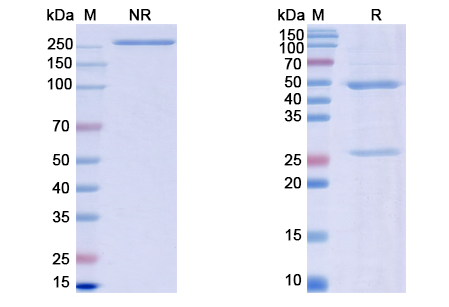Cart (0 Items)
Your cart is currently empty.
View ProductsIt looks like you are visiting from outside the EU. Switch to the US version to see local pricing in USD and local shipping.
Switch to US ($)



| Size | 100µg, 1MG |
|---|---|
| Isotype | IgG1 Lambda – Il21 fragment |
| Brand | ProteoGenix |
| Product type | Primary Antibodies |
| Clonality | Monoclonal Antibody |
| Expression system | XtenCHO |
| Applications | Elisa, WB |
| Product name | Latikafusp Biosimilar - Anti-PDCD1 mAb - Research Grade |
|---|---|
| Species | Homo Sapiens Fusion |
| Expression system | XtenCHO |
| Buffer | PBS buffer PH7.5 |
| Delivery condition | Blue ice (+4°C) |
| Delivery Time | 3-5 days if in stock; 3 week if production needed |
| Storage condition | store at -80°C |
| Brand | ProteoGenix |
| Aliases /Synonyms | Latikafusp,,PDCD1,anti-PDCD1 |
| Reference | PX-TA1856 |
| Note | For research use only. Not suitable for clinical or therapeutic use. |
| Isotype | IgG1 Lambda - Il21 fragment |
| Clonality | Monoclonal Antibody |
Latikafusp Biosimilar, also known as Anti-PDCD1 mAb – Research Grade, is a novel therapeutic antibody targeting the programmed cell death protein 1 (PDCD1) pathway. This biosimilar is designed to mimic the function of the original Latikafusp antibody, which has shown promising results in clinical trials for the treatment of various cancers. In this article, we will discuss the structure, activity, and potential applications of Latikafusp Biosimilar in the field of cancer therapy.
Latikafusp Biosimilar is a monoclonal antibody (mAb) that specifically binds to the PDCD1 receptor on the surface of immune cells. It is a chimeric antibody, meaning it is composed of both human and mouse components. The variable region of the antibody is derived from a mouse antibody, while the constant region is humanized to minimize potential immune reactions in patients. This structure allows for high specificity and affinity towards the PDCD1 receptor, making it a highly effective therapeutic agent.
The PDCD1 pathway plays a crucial role in regulating the immune response to cancer cells. PDCD1, also known as PD-1, is a receptor expressed on the surface of T cells, B cells, and natural killer cells. When activated by its ligands, PD-L1 or PD-L2, PDCD1 inhibits the function of these immune cells, allowing cancer cells to evade detection and destruction by the immune system. Latikafusp Biosimilar works by blocking the interaction between PDCD1 and its ligands, thus restoring the anti-tumor activity of immune cells.
The potential applications of Latikafusp Biosimilar are vast, as the PDCD1 pathway is involved in the development and progression of various types of cancer. Clinical trials have shown promising results in the treatment of melanoma, non-small cell lung cancer, and renal cell carcinoma. Furthermore, preclinical studies have also demonstrated the potential of Latikafusp Biosimilar in combination with other cancer therapies, such as chemotherapy and radiation, to enhance their efficacy.
The mechanism of action of Latikafusp Biosimilar involves blocking the interaction between PDCD1 and its ligands, PD-L1 and PD-L2. This prevents the inhibitory signal from being transmitted to immune cells, allowing them to recognize and attack cancer cells. Additionally, the binding of Latikafusp Biosimilar to PDCD1 may also trigger an immune response, further enhancing the anti-tumor activity of immune cells.
Compared to the original Latikafusp antibody, the biosimilar version offers several advantages. Firstly, it is more cost-effective, making it more accessible to patients. Secondly, the humanized constant region reduces the risk of immune reactions, making it a safer option for patients. Lastly, the biosimilar can be produced in larger quantities, ensuring a stable and reliable supply for clinical use.
In conclusion, Latikafusp Biosimilar is a promising therapeutic agent in the field of cancer therapy. Its specific targeting of the PDCD1 pathway and potential applications in various types of cancer make it a valuable addition to the current arsenal of cancer treatments. With ongoing clinical trials and further research, Latikafusp Biosimilar has the potential to improve patient outcomes and contribute to the fight against cancer.

Latikafusp Biosimilar - Anti-PDCD1 mAb, on SDS-PAGE under reducing and non-reducing conditions. The gel was stained overnight with Coomassie Blue. The purity of the antibody is greater than 95%.
Got a question or need a quote?
Message us and we’ll get back to you 48 hours or less.
Reviews
There are no reviews yet.